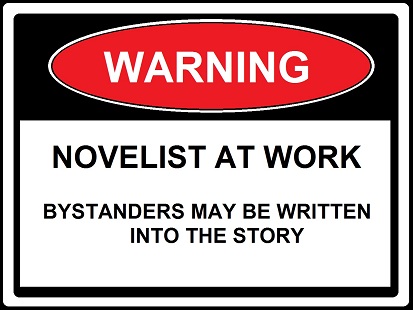A wise person will think before making a statement concerning individuals in their life to third parties. This is particularly true of statements that are written.
Authors, even authors of email and blog posts, ought to consider the impact of their content on both their readers and people who are their sources.
My friend The Alchemist says that, by definition, writers of fiction are liars. We draw from our experiences or the experiences of others to develop the various elements of the stories we tell. Beginners are urged to, “Write what if you know.”
It is not necessary for an author to have experienced every detail that they write about. Indeed, with all the stories of vampires and other fantastic creatures currently in vogue, inventors of such tales would have had to have led most unusual lives. So, an author who does not have direct knowledge of their subject may have to extrapolate their own more limited experiences and, through the craft of writing, apply what they can imagine the experience.
When we write what we know, we may be drawing from multiple sources including the experience of people in our lives. There are two points of caution here. The first is that the people whose lives we are adapting may not appreciate an author appropriating passages of their lives and presenting them to the public at large. Secondly, it is possible that the details we write – whether actual or invented – have the potential to harm our sources.
If an author is writing nonfiction, it’s important that the facts are correct. A practiced author will be able to provide documentation to prove statements made are indeed true. In addition to accuracy, consideration for relevant moral and ethical principles still apply.
An advantage to writing fiction is that it is not necessary to cite sources. This does not prohibit readers from drawing conclusions about the author’s sources. Nor does it preclude the possibility that a source, i.e. one of the authors friends, will become upset when reading distorted versions of their lives.
____
 In order to keep friends who have meaning in an author’s life, it is wise to consult with them about how the author is planning to adapt that friend’s personality and/or experiences and how the material will fit into the story.
In order to keep friends who have meaning in an author’s life, it is wise to consult with them about how the author is planning to adapt that friend’s personality and/or experiences and how the material will fit into the story.
Today, it is not uncommon for a person who knows I am a writer to say to me, “I’m going to tell you something, but you have to promise me you will not write about this!” And of course, I do not.
I’ve also had a friend who is a writer say, “I’ve had a similar experience but I can’t tell you about it, because you would write about it before me.” This would not have happened, but who am I to disabuse a friend of a harmless fantasy? After all, there are authors who would not respect another writer’s work.
There are stories in our lives which are so good that the truth of actual events cannot be disguised without damaging the story. In cases like this, I will share an early draft of the scene with the person who it is based on and ask if they have any objections.
My friends appear to trust me and, to date, no one has asked me to remove a scene.
The system I use is not perfect. One friend wishes my story came out differently. We remain friends though I doubt I will ever be able to count this person as one of my readers.
It’s satisfying enough that we’re still friends.
– Jeffrey A. Limpert
__________________
References:
Click here to download the hi-res novelist sign.
Image Information:
Novelist at Work
By Jeffrey A. Limpert
https://unfoldingseries.com/uf9/wp-content/uploads/2012/10/Warning-Novelist-1200.jpg
_____
Rome visit, June 2008 – 57
By Ed Yourdon
https://secure.flickr.com/photos/yourdon/2573762303/

 Amazon – Unfolding: Awakening
Amazon – Unfolding: Awakening